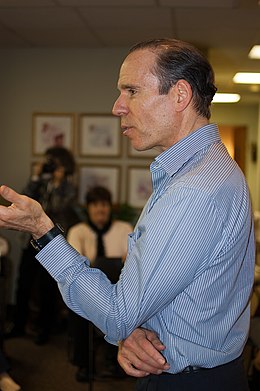Joel Fuhrman
| Joel Fuhrman | |
|---|---|
| Other names | Joel H. Fuhrman |
| Website | https://www.drfuhrman.com/ |
| Born | 12-2-1953 New York City |
| Occupation | Family physician, author |
| Known for | Recommends nutrient-dense, non-processed foods such as fresh vegetables, beans, nuts, seeds, and fruit, and some whole grains. |
Joel Fuhrman, M.D., (Dec. 2, 1953 - ?) is an American physician, nutritional researcher, expert on natural healing, and a New York Times best-selling author. Dr. Fuhrman advocates for a micronutrient-rich, low oil and salt, plant-based diet. He refers to this way of eating as the nutritarian diet. It includes nutrient-dense, non-processed foods such as fresh vegetables, beans, nuts, seeds, and fruit, and some whole grains.[1] Now semi-retired, his practice as a board-certified family physician was based on his nutrition-based approach to obesity and chronic disease, and he has documented his recommendations for health and longevity in a number of best-selling books. He also sells nutritional supplements that were developed specifically for his medical practice and tailored for people eating a plant-based, whole-food diet long term.[2] As of 2025, Dr. Fuhrman writes, teaches and publishes podcasts about nutrition. He also runs a nutritional support website and a California retreat for people wanting help beginning a nutritarian diet.
His books include:
- Eat for Life (2020)
- Eat to Live (2011)[3]
- Super Immunity (2012)[4]
- The Eat to Live Cookbook (2013)[5]
- Diabetes (2013)
- The End of Dieting (2014)[6]
- The End of Heart Disease (2016)[7][8]
Life and career
Fuhrman was born in New York City, on December 2, 1953. He was a competitor in the amateur figure skating circuit.[2] He was a member of the US World Figure Skating Team and placed second in the US National Pairs Championship in 1973. In 1973, he suffered a heel injury which prevented him from competing. Fuhrman claims that an alternative medicine therapy recommended by a naturopath helped speed his recovery, and led him to become interested in alternative medicine. He came in 3rd place at the 1976 World Professional Pairs Skating Championship in Jaca, Spain, skating with his sister, Gale Fuhrman,[9] but due to short-term massive muscle loss from fasting was unable to make the Olympic team. In 1988, he graduated from the Perelman School of Medicine at the University of Pennsylvania. Fuhrman is a board-certified family physician and serves as Director of Research for the Nutritional Research Foundation.[10]
Diet and health
Nutritarian diet
Fuhrman has advocated eating at least one pound of raw vegetables and another pound of cooked vegetables each day with an emphasis on green vegetables along with beans, onions, mushrooms, berries, nuts and seeds. He also recommends eating at least one cup of beans a day to benefit from the resistant starch and increased satiety.[11] The Nutritarian diet encourages whole plant foods and restricts dairy products, meat, snacks between meals, fruit juice, vegetable oils and processed foods.[2][11]
Furhman's Nutritarian diet excludes dairy and meat for six weeks, but after this period a small amount of chicken and fish can be eaten.[12] Fuhrman also allows a limited amount of low-fat dairy products, olive oil and refined carbohydrates on the diet after six weeks.[11] If animal products are not added back into the diet, Furhman recommends vitamin B12, vitamin D, omega 3 and other supplements.[11] On the Nutritarian diet, dairy products, eggs and fish are to make up less than 10% of calories whilst legumes make between 10% to 40% and raw and cooked vegetables make between 30% and 60% of calories.[1]
Nutrient density
Fuhrman popularized the notion of nutrient density in what he calls the Health Equation: Health = Nutrients/Calories (abbreviated as H = N/C).[2] Peter Lipson, a physician and writer on alternative medicine, has been heavily critical of Fuhrman's health equation, writing that since its terms cannot be quantified, it is "nothing more than a parlor trick".[13] Fuhrman created what he calls the "Aggregate Nutrient Density Index" or ANDI, a ranking of foods based on his claims of micronutrient concentration and kale is at the top of this list.[2] Whole Foods began using the scores as a marketing project and reported that the sales of high scoring foods "skyrocketed".[2]
Provenance
- Some content on this page may previously have appeared on Wikipedia.
References
- ↑ Jump up to: 1.0 1.1 "Nutritarian Diet". health.usnews.com. Retrieved March 5 2023.
- ↑ Jump up to: 2.0 2.1 2.2 2.3 2.4 2.5 Adams, Mark. Joel Fuhrman: The doctor is out there, Men's Journal, Oct 2012.
- ↑ Paperback Advice & Misc. Books - Best Sellers - Feb. 10, 2013 - The New York Times, The New York Times. (in en-US)
- ↑ Hardcover Advice & Misc. Books - Best Sellers - Oct. 7, 2012 - The New York Times, The New York Times. (in en-US)
- ↑ Food and Diet Books - Best Sellers - Nov. 3, 2013 - The New York Times, The New York Times. (in en-US)
- ↑ Advice, How-To & Miscellaneous Books - Best Sellers - April 13, 2014 - The New York Times, The New York Times. (in en-US)
- ↑ Advice, How-To & Miscellaneous Books - Best Sellers - April 24, 2016 - The New York Times, The New York Times. (in en-US)
- ↑ Fuhrman, Joel (2016). The End of Heart Disease. Description & arrow-searchable preview. HarperOne. Retrieved 26 July 2021.
- ↑ World Professional Figure Skating Championships (Jaca, Spain).
- ↑ (2011) "Probiotics and the immune system: An interview with Joel Fuhrman, M.D.". Nutrition Health Review 108 (Winter).
- ↑ Jump up to: 11.0 11.1 11.2 11.3 Schweitzer, Lisa. Eat to Live Diet: Review (en).
- ↑ "What Foods Are Not Allowed on Dr. Fuhrman's Eat to Live Diet?". healthyeating.sfgate.com. Retrieved March 5 2023.
- ↑ Lipson, Peter (9 September 2010). Your disease, your fault. Science-Based Medicine.
